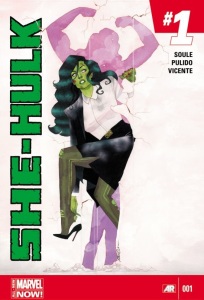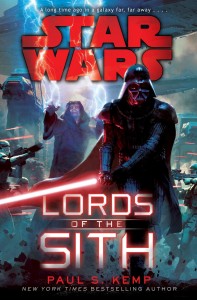 Not long ago it was revealed that the current She-Hulk comic series will come to an end with issue 12. It was a sad day, not only because the book is fantastic, but also because the character has something very important:
Not long ago it was revealed that the current She-Hulk comic series will come to an end with issue 12. It was a sad day, not only because the book is fantastic, but also because the character has something very important:
She-Hulk has a life.
She has friends and a career and a commute to work and a bar she hangs out at and she has all of these things while still continuing to be undeniably She-Hulk.
She-Hulk, AKA Jennifer Walters, attorney-at-law, is close to my heart for all kinds of reasons, but what makes her stand out, other than being tall and green, is that she continues on with normal, everyday things while existing outside of the expected. She falls outside of the perceived norm but she refuses to let that define her. She is tall and she is strong and she is green and she continues to be tall and strong and green in everyday life, when she’s at her day job or getting drinks after work or meeting friends for coffee.
She-Hulk is clearly different from the way people are expected to be and is perceived by many as abnormal and intimidating, but she continues to live and work alongside the un-superpowered members of society. She does not let the parts of herself that are considered divergent from the perceived norm alienate her and she does not hide them. She embraces them and continues on with her life and I think that that is incredibly important.
She-Hulk is different, she embraces that, and she does not let that define her.
This is not something you see a lot in superhero comics and that is a huge shame. It’s a missed opportunity, both because it can be extremely comforting and inspiring to see characters like that and also because it makes a lot of sense from a setting standpoint.
In worlds like the Marvel or DC universes, there is a sizable population of people with superpowers. The idea that no one would incorporate their powers into their everyday life or that no one with superpowers would continue to have a life beyond that while still displaying their superpowered nature is, frankly, ridiculous. And yet you rarely see someone with superpowers have a life beyond superheroic or supervillainous antics unless they’re hiding their powers or are someone whose “everyday” life is already far outside of what anyone would consider ordinary, like an eccentric billionaire inventor. The few exceptions to this are people like Carol Danvers, AKA Captain Marvel, who is superpowered and can demolish buildings with her fists, yes, but still appears to be a typical human. Carol Danvers walking down the street looks like just another person walking down the street; Jennifer Walters walking down the street is a giant green woman. That she is different is noticeable, whether or not you know who she is.
 There’s also character and storytelling potential in giving characters lives outside of superpowered antics. By doing so, there’s a greater variety of kinds of stories you can tell. She-Hulk incorporates her superpowered status into her work as a lawyer, often working on superhuman related cases with the unique understanding of someone who is, herself, a superhuman and she’s able to pursue dangerous leads and accept dangerous cases that a lawyer without her superhuman toughness wouldn’t be able to.
There’s also character and storytelling potential in giving characters lives outside of superpowered antics. By doing so, there’s a greater variety of kinds of stories you can tell. She-Hulk incorporates her superpowered status into her work as a lawyer, often working on superhuman related cases with the unique understanding of someone who is, herself, a superhuman and she’s able to pursue dangerous leads and accept dangerous cases that a lawyer without her superhuman toughness wouldn’t be able to.
And, of course, there’s also the added benefit of being able to work skills and interests from a character’s daily life into their superpowered antics, something you see some of from characters with secret identities as well, but for the most part there’s a very small range of careers that superpowered individuals have. For every Barbara Gordan, using her librarian skills to aid in her crime-fighting as Batgirl and later as Oracle, there are how many genius scientists? Incorporating careers with less obvious applications for heroics into the story is interesting and adds variety to the stories themselves.
This is where the Jedi come in.
Back in the Olden Days of the Star Wars Legends books, before Episode I was released and changed everything forever, Jedi were allowed to have lives beyond simply being Jedi. Some were Jedi full-time but there others who maintained careers and families.
Then the prequel trilogy came along and presented a different kind of Jedi Order, one in which all of its members live entirely as Jedi and as nothing else. They live in the Jedi Temple with other Jedi, travel to do Jedi things on the orders of the Jedi council, and are not permitted careers or families so that they may remain wholly dedicated to the Order. They can leave the order, but they are chosen to be inducted into it as small children and are raised their whole lives to be Jedi and nothing else. There are no part-time Jedi. There are no people living their lives where they chose and then acting independently as Jedi when they see the need. There seem to be a few more specialized Jedi, but their role is clearly to support the other Jedi.
The old Jedi Order lived apart from the galaxy it served, separating itself so that its members could devote the entirety of their lives to being Jedi.
While I can understand why the old Order went in this direction, I feel like the new Order should be a bit more like She-Hulk. Even beyond the clear problems that come with separating yourself like the old Order did (please note how the Emperor was able to create a demonizing fiction about them and how they no longer exist), image the storytelling possibilities. Imagine people with great Force abilities, being trained in the Force and working to serve the galaxy with it, but having lives and careers beyond that. Imagine Jedi pilots, Jedi relief workers, Jedi construction workers, using their Force abilities while participating in the world around them, in addition to full-time Jedi knights.
Imagine Jedi navigating what it means to be Jedi in their everyday life.
Imagine Jedi embracing that which makes them stand out from the norm while not letting it alienate them from the galaxy.
If the new Jedi are once again separated, like the old Order was, it won’t be worst thing. But there’s so much potential for so many stories in which Jedi go about being Jedi in different ways and using different skill sets. I would love to see that potential used.
 I don’t want to feel conflicted about this, but there’s no way around it.
I don’t want to feel conflicted about this, but there’s no way around it.


